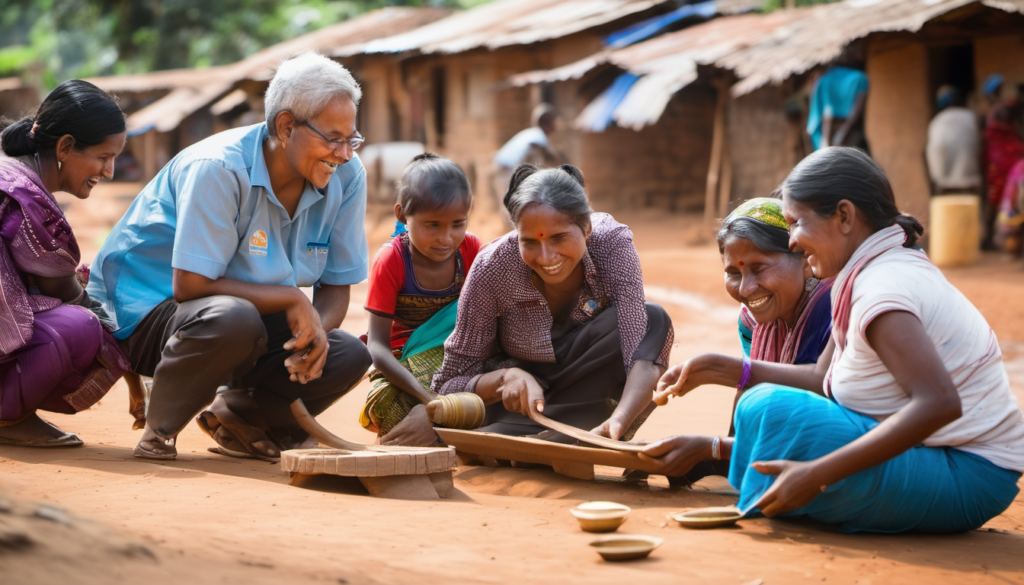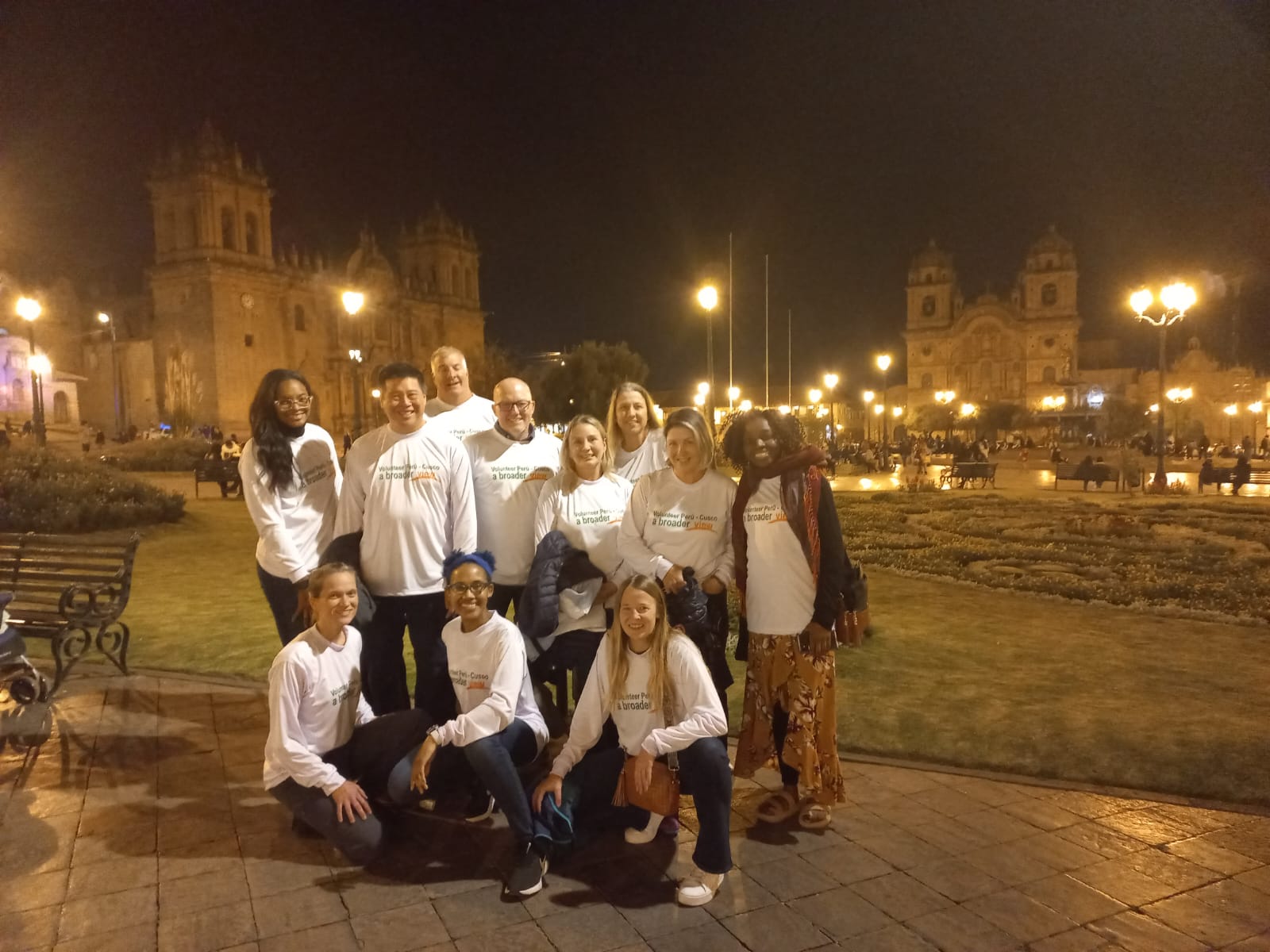Welcome to a world where sustainable social change is pursued through community development. In this article, we will delve into ABV’s unique approach and philosophy to creating lasting impact in communities around the world. Get ready to discover how ABV is making a difference and how you can get involved.
Have you ever wondered what it takes to make a real, meaningful change in the world? Perhaps you’ve felt a strong desire to give back and make a positive impact, but were unsure of how to go about it. ABV (A Broader View) is here to guide you on a journey of community development through sustainable social change.
ABV believes that sustainable social change is not just about quick fixes or temporary solutions. It’s about transforming communities so that they can flourish and thrive for generations to come. By focusing on education, healthcare, and livelihood, ABV works towards creating a better future for all.
So, what exactly is sustainable social change and why is community development so important? Let’s explore these concepts in detail in the next section.

Understanding Sustainable Social Change
Defining Sustainable Social Change
Sustainable social change refers to long-term positive transformations within communities that are aimed at improving the well-being of individuals and society as a whole. It involves addressing root causes of social issues rather than simply providing short-term solutions. Sustainable social change is focused on creating lasting impact and sustainable development in areas such as education, healthcare, and economic development.
It is important to understand that sustainable social change goes beyond charity or temporary fixes. It involves empowering individuals and communities to become active participants in their own development, enabling them to create lasting change from within. This approach recognizes the importance of building capacity, promoting self-reliance, and fostering community ownership.
The Importance of Community Development
Community development plays a crucial role in achieving sustainable social change. By engaging and involving the community in the development process, it ensures that interventions are tailored to the specific needs and aspirations of the people. Community members become active agents of change, working together to address social issues and improve their quality of life.
When community development is approached in a sustainable and holistic manner, it has the potential to create a ripple effect that goes beyond the immediate beneficiaries. Community members who have been empowered and equipped with knowledge and skills can serve as catalysts for change, inspiring others to follow suit. This leads to the creation of a self-sustaining cycle of development that can have a transformative impact on the entire community.
The Benefits of Community Development
- Community ownership: When community members are actively involved in the development process, they take ownership of the initiatives and feel a sense of pride and responsibility towards the outcomes.
- Tailored interventions: Community-based development allows for interventions that are specifically designed to address the unique challenges and opportunities within a particular community.
- Long-term impact: Sustainable social change focuses on creating lasting impact by addressing root causes and implementing solutions that can be sustained over time.
- Strengthened social fabric: Community development efforts foster collaboration, social cohesion, and trust among community members, strengthening the social fabric of the community.
- Increased resilience: Empowered communities are better equipped to withstand and recover from future challenges and setbacks, building resilience and adaptability.
By understanding the importance of sustainable social change and the role of community development, we can work towards creating a more equitable and inclusive society where everyone has the opportunity to thrive. ABV’s philosophy and methodology align with these principles, ensuring that their projects have a meaningful and long-lasting impact.

ABV’s Philosophy and Methodology
At ABV, we approach community development with a specific philosophy and methodology that underpins our work. Our goal is to create sustainable social change that empowers communities and improves the quality of life for their members. Let’s dive into the key aspects of ABV’s philosophy and methodology:
Mission and Vision
Our mission is to promote long-lasting, positive change in communities around the world. We believe that every community has the potential to thrive and grow, and we work towards achieving this through our volunteer programs. Our vision is to create a world where all communities have access to equal opportunities, resources, and support to reach their full potential.
Approach to Community Development
ABV’s approach to community development is rooted in collaboration, participation, and sustainability. We believe that true change comes from within the community itself, and our role is to facilitate and support their efforts. Here are some key aspects of our methodology:
- Needs Assessment: Before initiating any projects, we conduct thorough needs assessments to understand the specific challenges and opportunities in each community. This helps us tailor our interventions and ensure they are aligned with the community’s priorities.
- Capacity Building: We invest in building the capacity of individuals, organizations, and communities to effectively address their own challenges and sustain change in the long term. This includes providing training, resources, and mentoring to empower them to take ownership of their development.
- Participatory Approach: We believe in the power of collaboration and active participation. We engage with community members, local leaders, and relevant stakeholders throughout the project lifecycle to ensure their voices are heard, their ideas are valued, and their ownership is established.
- Sustainability: We strive to create sustainable solutions that can continue beyond our involvement. This involves building local partnerships, transfer of knowledge and skills, and working towards creating systems and structures that can support long-term progress.
The Impact of ABV’s Philosophy and Methodology
By adhering to our philosophy and methodology, ABV has been able to create a significant impact in the communities we work with. Here are some examples of the projects we have successfully implemented:
- Education and Literacy Programs: We have established and supported schools, libraries, and education centers to improve access to quality education for children and adults. Our programs focus not only on academic learning but also on life skills development.
- Healthcare Initiatives: We have worked on various healthcare projects, including setting up medical clinics, providing health education, and training local healthcare providers. Our aim is to improve healthcare access, awareness, and overall well-being.
- Livelihood and Economic Development: We have launched initiatives to promote entrepreneurship, vocational training, and income-generation activities. By empowering individuals to become self-reliant, we contribute to poverty alleviation and economic growth.
Through these projects, we have witnessed sustainable social change taking root in communities. However, measuring the impact of our work is essential. In the next section, we will explore how ABV evaluates and measures sustainable social change to ensure the effectiveness of our interventions.
Key Principles for Effective Community Development
When it comes to community development, there are certain key principles that can make a significant impact on the effectiveness and sustainability of the projects. At ABV, we believe in these principles and follow them closely in all our community development initiatives. Let’s take a closer look at these key principles:
1. Empowerment and Ownership
Empowering the community members and fostering a sense of ownership is crucial for any community development project to succeed. It is important to involve the community at every stage of the project, from planning to implementation. When the community feels a sense of ownership, they are more likely to actively participate and take responsibility for the progress and success of the project.
2. Cultural Sensitivity and Adaptability
In community development, cultural sensitivity and adaptability are essential for bridging the gap between different cultures and backgrounds. It is important to respect and value the local customs, traditions, and beliefs. By understanding and adapting to the cultural nuances of the community, we can build trust and establish meaningful connections. This allows us to develop solutions that are tailored to the specific needs and challenges of the community.

3. Collaboration and Partnerships
Collaboration and partnerships play a critical role in effective community development. By working together with local organizations, non-profits, government agencies, and other stakeholders, we can pool our resources, knowledge, and expertise. This allows us to leverage collective efforts and achieve greater impact. Collaboration also helps in building sustainable relationships and networks that can support the long-term development of the community.
These key principles serve as a foundation for our community development approach at ABV. We believe that by adhering to these principles, we can create lasting and sustainable change in the communities we work with.
“Empowering communities, respecting their culture, and collaborating with local partners are key principles for effective community development.”
ABV’s Projects and Impact
At ABV, we believe in creating sustainable social change through community development. We are proud of the impactful projects that we have initiated and the positive changes we have brought to communities around the world. Here, we will explore some of ABV’s key projects and their impact:
Education and Literacy Programs
Education is one of the most powerful tools for empowering individuals and communities. ABV has been actively involved in implementing education and literacy programs in various locations. These programs aim to provide quality education for children, tackle illiteracy rates, and bridge the educational gap.
Some of our projects include:
- Building Schools: ABV has helped in the construction of schools, ensuring that children have a safe and conducive learning environment.
- Teacher Training Programs: We have organized training programs to enhance the skills and knowledge of local teachers, enabling them to deliver quality education.
- Providing Educational Resources: ABV has donated books, computers, and other necessary educational resources to schools, ensuring students have access to essential learning tools.
The impact of these programs is evident through increased literacy rates, improved educational opportunities, and a brighter future for the next generation.
Healthcare Initiatives
Access to healthcare is a fundamental right that should be available to everyone. ABV has been actively involved in implementing healthcare initiatives to address the healthcare needs of marginalized communities. Some of our healthcare projects include:
- Medical Camps: ABV organizes free medical camps in underserved areas, providing essential healthcare services and raising awareness about health-related issues.
- Community Health Workshops: We conduct educational workshops to promote preventive healthcare practices and empower individuals to take charge of their well-being.
- Medical Infrastructure Development: ABV has supported the development of medical facilities, such as clinics and hospitals, in areas lacking access to adequate healthcare.
These initiatives have had a significant impact on improving healthcare access, reducing morbidity and mortality rates, and empowering communities to prioritize their health.
Livelihood and Economic Development
Poverty and unemployment are major challenges faced by many communities. ABV focuses on implementing livelihood and economic development projects to empower individuals and communities to become self-sustainable. Some of our projects include:
- Skills Training Programs: ABV provides vocational training programs that equip individuals with valuable skills, helping them secure better employment opportunities.
- Microfinance Support: We offer microfinance support to entrepreneurs, enabling them to start or expand their small businesses and improve their financial stability.
- Agricultural Development: ABV works with communities to develop sustainable agricultural practices, ensuring food security and income generation.
Through these livelihood and economic development initiatives, ABV has helped individuals gain financial independence, lift themselves out of poverty, and create a better future for themselves and their families.
ABV’s projects have brought about significant positive changes in the communities we serve. The impact can be seen in terms of improved education, enhanced healthcare services, and sustainable livelihood opportunities. We are committed to continuing this work and making a lasting difference in the lives of individuals and communities worldwide.

Measuring Sustainable Social Change
Measuring the impact of community development initiatives is crucial to ensure that they are effective and sustainable. It allows organizations like A Broader View (ABV) to track progress, identify areas for improvement, and make data-driven decisions. When it comes to measuring sustainable social change, ABV follows a comprehensive approach that combines outcome-based evaluation and monitoring and feedback.
Outcome-based Evaluation
ABV believes in measuring outcomes rather than just outputs. This means focusing on the long-term effects of community development projects, rather than simply counting the number of activities or services provided. By measuring outcomes, ABV can assess the real impact of its initiatives and determine if they are making a positive difference in the lives of individuals and communities.
Key elements of ABV’s outcome-based evaluation approach include:
- Setting clear goals and objectives: Before implementing a project, ABV defines specific goals and objectives that align with the needs and aspirations of the community. These goals serve as benchmarks for measuring success and progress.
- Collecting quantitative and qualitative data: ABV gathers both quantitative data (such as the number of individuals impacted, changes in key indicators) and qualitative data (such as stories, testimonies, and feedback) to provide a comprehensive understanding of the outcomes achieved.
- Comparing results to baseline data: To assess the impact of its projects, ABV compares the results to baseline data collected at the beginning of the initiative. This allows them to determine the extent of change and improvement over time.
- Engaging stakeholders: ABV actively involves stakeholders, including community members, partner organizations, and local authorities, in the evaluation process. Their perspectives and experiences provide valuable insights into the effectiveness and sustainability of the projects.
Monitoring and Feedback
In addition to outcome-based evaluation, ABV emphasizes the importance of continuous monitoring and feedback throughout the implementation of community development projects. This allows for timely adjustments and improvements, ensuring that the initiatives remain on track and responsive to the needs of the community.
ABV’s approach to monitoring and feedback includes:
- Regular data collection: ABV collects data at regular intervals to monitor progress and identify any challenges or issues that may arise. This data helps in understanding the effectiveness of the interventions and enables ABV to make informed decisions about course corrections if needed.
- Feedback loops: ABV maintains open lines of communication with the community and other stakeholders, actively seeking their feedback and input. This helps in identifying areas of improvement, addressing concerns, and building trust and collaboration.
- Adaptive management: Based on the feedback received and the data collected, ABV adapts its strategies and approaches to better meet the needs of the community. This flexibility ensures that the initiatives are responsive to changing circumstances and remain effective in achieving sustainable social change.
“Measuring sustainable social change is not just about numbers; it’s about understanding the real impact on people’s lives and making informed decisions to drive positive change.” – A Broader View
By combining outcome-based evaluation with monitoring and feedback, ABV ensures that its community development projects are not only impactful but also sustainable in the long run. These measurement strategies help ABV to continuously learn and improve its approaches, contributing to the overall well-being and empowerment of communities around the world.
Challenges and Lessons Learned
Community development is a complex and challenging process that requires careful planning, dedication, and adaptability. Throughout our journey, ABV has encountered various challenges and learned valuable lessons that have shaped our approach to sustainable social change. In this section, we will discuss some of the common challenges faced in community development and the lessons we have learned along the way.
Addressing Cultural Barriers
One of the most significant challenges in community development is addressing cultural barriers. Communities often have their own unique traditions, beliefs, and ways of doing things, which can differ significantly from the approaches implemented by external organizations. To effectively address these cultural barriers, ABV has learned the importance of:
- Cultural sensitivity: It is crucial to approach community development with an open mind and respect for local customs and traditions. Taking the time to understand and appreciate the community’s culture helps establish trust and build strong relationships.
- Adaptability: Flexibility is key when working with different communities. It is essential to listen to the community’s needs, ideas, and concerns and adapt strategies accordingly. This approach ensures that projects are tailored to the specific context and resonate with the community.
Managing Resources and Sustainability
Another challenge often encountered in community development is resource management and sustainability. Limited resources, both financial and human, can pose significant obstacles. ABV has learned the following lessons when it comes to managing resources and ensuring long-term sustainability:
- Effective planning: Thorough and realistic planning is crucial to make the most of available resources. Clearly defining project goals, objectives, and timelines helps maximize the impact and efficiency of community development initiatives.
- Capacity building: Building the capacity of the community members and local organizations is essential for long-term sustainability. ABV focuses on empowering community members to take ownership of projects and develop the skills necessary to continue the work even after the organization’s involvement ends.
“Give a man a fish, and you feed him for a day. Teach a man to fish, and you feed him for a lifetime.” – Lao Tzu
By providing training and support, ABV ensures that communities can sustain the positive changes initiated during the development process.
- Partnerships and collaboration: Creating partnerships and collaborating with local organizations, government agencies, and other stakeholders is a vital component of successful community development. By working together, resources can be pooled, expertise can be shared, and impact can be amplified.
In conclusion, community development is not without its challenges, but through persistence and a willingness to adapt, these obstacles can be overcome. ABV has learned valuable lessons that have shaped our approach to sustainable social change. By addressing cultural barriers and managing resources effectively, we can work hand in hand with communities to create lasting and impactful change.
The Role of Volunteers in Community Development
Volunteers play a vital role in community development by contributing their time, skills, and energy to make a positive impact. They are the heart and soul of many organizations, including A Broader View (ABV), which is dedicated to promoting sustainable social change through community development initiatives. If you are considering volunteering and want to know how you can be part of this meaningful work, keep reading to learn more about the role of volunteers in community development.
Volunteer Opportunities with ABV
ABV offers a wide range of volunteer opportunities that align with different areas of community development. By joining ABV, you can choose to volunteer in fields such as education, healthcare, or economic development. Let’s explore some of the volunteer opportunities available:
- Education and Teaching: Volunteers can work in schools or educational centers to support teachers, develop curriculum, or provide tutoring to students.
- Healthcare Support: If you have a medical background, you can help in clinics, hospitals, or healthcare centers by providing care to patients or assisting with administrative tasks.
- Livelihood and Economic Development: Volunteers can contribute to projects focused on empowering local communities through sustainable economic practices, including vocational training or supporting small business initiatives.
No matter which opportunity you choose, volunteering with ABV allows you to directly impact the lives of individuals and communities in need.
Building Cross-cultural Understanding
One of the unique benefits of volunteering in community development is the opportunity to build cross-cultural understanding. When you immerse yourself in a different community and work alongside local people, you gain a deeper appreciation for their culture, values, and challenges. Through this exchange, you can break down stereotypes, bridge divides, and foster mutual respect.
ABV values cultural sensitivity and encourages volunteers to approach their work with an open mind and a willingness to learn from local communities. By understanding and respecting cultural differences, volunteers can work effectively and make a lasting impact on community development.
Volunteering also provides personal growth and learning opportunities, allowing you to develop new skills, gain valuable experience, and enhance your global perspective. It is a chance to step outside of your comfort zone and make a meaningful contribution while learning about yourself and the world around you.
“Volunteering is the ultimate exercise in democracy. You vote in elections once a year, but when you volunteer, you vote every day about the kind of community you want to live in.” – Marjorie Moore
Conclusion
In conclusion, A Broader View Volunteers (ABV) is committed to achieving sustainable social change through community development. Their approach focuses on empowering local communities and fostering cultural exchange to create meaningful and life-changing experiences for volunteers and community members alike. By implementing key principles such as empowerment, cultural sensitivity, and collaboration, ABV aims to create lasting impact in the areas of education, healthcare, livelihood, and economic development.
Through outcome-based evaluation and continuous monitoring and feedback, ABV ensures that their projects are making a tangible difference in the communities they serve. They strive to address challenges such as cultural barriers and resource management, continuously learning and adapting their methods to achieve the greatest impact.
Volunteers play a crucial role in ABV’s community development efforts. By participating in ABV’s volunteer opportunities, individuals have the opportunity to engage in cross-cultural understanding and contribute to sustainable change on a grassroots level. By joining ABV’s projects, volunteers become part of a global movement towards empowerment and social justice.
If you’re looking for a meaningful experience that goes beyond traditional travel, consider volunteering with A Broader View. Not only will you have the chance to make a positive impact, but you’ll also gain a deeper understanding of different cultures and contribute to sustainable social change. Visit their website at www.abroaderview.org to learn more about their volunteer programs and how you can become part of their community development initiatives.
With A Broader View Volunteers, you can be a catalyst for sustainable social change and make a difference in the lives of individuals and communities around the world. Start your journey today and be part of a global movement towards a better future for all.
Frequently Asked Questions
- What is ABV and what is their approach to community development?
ABV is an organization that focuses on community development through sustainable social change. Their approach involves working closely with local communities, empowering them to identify their needs and goals, and providing resources, education, and training to help them achieve sustainable development.
- How does ABV ensure the sustainability of their community development projects?
ABV ensures sustainability by involving and empowering the local community members in every step of the project. They believe in building local capacity and providing education and training to ensure that the community can continue the work even after ABV’s involvement ends.
- What are the core principles that ABV follows in their community development projects?
The core principles that ABV follows include participatory approach, cultural sensitivity, long-term commitment, capacity building, and creating partnerships with local organizations and stakeholders. These principles ensure that the projects are effective, respectful, and impactful.
- Does ABV only work on community development projects internationally?
No, ABV works on community development projects both internationally and domestically. They believe that sustainable social change is needed in all communities, regardless of location, and they are committed to making a positive impact wherever they operate.
- How can individuals get involved with ABV’s community development projects?
Individuals can get involved with ABV’s community development projects by volunteering their time and skills, making donations to support the projects, or spreading awareness about ABV’s work. ABV offers various volunteer opportunities both locally and internationally.
-
Safe Solo Volunteering Abroad | Empowerment FemalesThrough Service with ABV

Embrace the adventure of a lifetime with ABV’s supported solo volunteering programs. Create lasting friendships, make a real difference, and explore the world safely under a supportive umbrella. Recommend Peru, Ecuador, Colombia, and more. Table of Contents Introduction to ABV and Solo Volunteering Traveling solo can be a thrilling yet daunting endeavor. A Broad View…
-
Empowerment Through Sustainable programs: Volunteer Opportunities in Peru Cusco

Discover empowering volunteer opportunities in Peru Cusco with www.abroaderview.org. Support sustainable programs and make a positive impact while gaining valuable experiences.
-
Midwives & Obstetricians: Empower Mothers & Babies Abroad

Discover how midwives and obstetricians from abroad can empower mothers and babies through the programs offered by www.abroaderview.org. Make a difference today.



